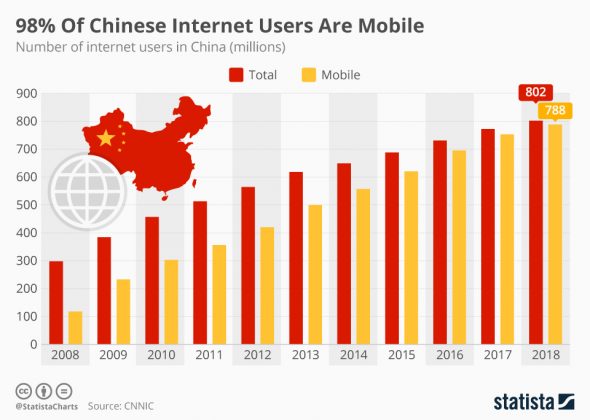China’s internet landscape is the largest in the world. With over 800 million Internet users (most of them mobile), the Chinese market represents a big opportunity for US and European companies.
However, Chinese Internet landscape also presents unique challenges Western companies need to solve if they want to establish their business in Mainland China. Latency issues due to geographical distance, the Great Firewall of China, and strict business regulations can dissuade even the most ardent enterprises.
Book a demo today to see GlobalDots is action.
Optimize cloud costs, control spend, and automate for deeper insights and efficiency.

In this article we discuss the Internet use in China, what challenges the Chinese Internet market presents, and how enterprises can overcome them to thrive in the Chinese market.

Infrastructure overview
The Internet infrastructure in China has three primary delivery systems: fixed-line, mobile and education. Education is in a special category due to the introduction of the China Education and Research Network (CERNET), a special backbone which delivers content to educational institutions within China. China Unicom, a company formed from the merger of China Unicom and China Netcom, is one of the two largest fixed-line infrastructure companies within China. The other major firm is China Telecom. In the mobile space, China Mobile is the largest firm. All of these firms are state-operated, with China Unicom based in Hong Kong.
In terms of communications, the majority of countries employ one or more Border Gateway Protocol (BGP) devices. A BGP device is much like a boundary of a particular network, and is the point at which traffic flowing into and out of that network is managed. Internet Data Centers (IDCs) in China will often connect to the BGPs owned by the major companies. At a minimum, the IDCs will generally have a connection to a single BGP. In some cases, an IDC may connect to two BGPs, which is called dual-line. And a full access IDC will connect to all the major BGPs.
Key challenges
The first factor that impacts European brands web performance is the sheer distance from Europe to China. It comes as no surprise that the 4,000 odd miles between Europe and China plays a role in causing delays to web performance. Usually, distance is the factor that impacts performance the most, as the number of exchanges between the origin server and the end-user adds to website loading time.
The second factor that causes latencies is as mentioned above, the Great Firewall itself, China’s unique internet filtering system. But the Great Firewall even causes delays to websites delivered from Hong Kong into China – in fact, the Firewall’s filtering process slows websites down by up to 40%.
The third is the latency caused by China’s internet infrastructure. In China, there are only a few Internet Service Providers (ISPs) – such as China Telecom, China Mobile and China Unicom to name a few. These state-owned ISPs are solely responsible for handling the traffic of 700 million internet users (which is also likely to impact web performance in the region). And for traffic to pass between these ISPs, traffic peering is required, and this is where the problem lies.

Because China’s internet infrastructure has limited peering points, fragmented network topology and poor connectivity, simply setting up data centers in China’s major cities is not enough to ensure high performance, as it doesn’t help with delivery across the whole region. For European businesses looking to successfully launch websites in China, you have to tackle in-country latencies in a more targeted fashion, which is why many businesses turn to content delivery networks.
Any provider of content within China must register as an Internet Content Provider (ICP). This includes foreign companies that wish to transmit content into China.
The ICP registration is administered by private companies within China who self-censor content for any violations of Chinese law. If content is delivered without an ICP, it will likely be shut down.
Carriers within China often will effectively ban competing content. That includes advertisements for competitors. This means that ad placement is a bit more sensitive in China. If a company offer advertising placement to competitors of the carrier on which their traffic flows, they may find that content is not delivered and the purpose of the advertising is thwarted.
China’s large population and high population density, along with ICP and regulatory requirements, makes for interesting challenges in terms of connectivity. There are issues with connections, challenges with congestion, and difficulties that can arise from technical outages.
How partnering with a CDN provider helps
Doing business in China on the Internet means understanding the landscape in terms of infrastructure, competition, and regulation. On all three counts there are principles to follow that will maximize the potential for success. Each count lends itself well to partnering.
A Content Delivery Network (CDN) provider is important regardless of country. Move your content closer to where it is needed and have a place it can be cached that can assist in times of high latency. It allows one to leverage the advantages of content aggregation in terms of relationships with providers and increases the odds of a DC with full access BGP.
A CDN registered in China addresses the Great Firewall issues and also ensures sensitivity to local regulations. A CDN within China will be aware of emerging content trends and follow them to the benefit of its clients. It will also have domestic assistance in times of trouble, such as cables being cut or issues affecting overall transmission country-wide.
A CDN partner that supports high-availability, has domestic support staff and knowledge of the domestic market will assist a company in flourishing within China. The reality is that there are many cases where local presence near the delivery target will be critical. A partner also will ensure that its own content does not result in an adverse impact on its customers.
Conclusion
Establishing business operations in China can be challenging if you’re doing it on your own, but it’s not that hard if you get help from a knowledgeable business partner which provides you with a CDN solution for China, as well as regulatory advice. If you have any questions, contact us today to help you out with your performance and security needs.






